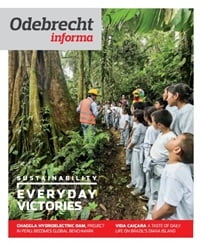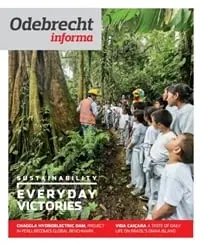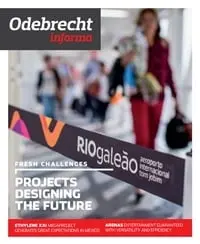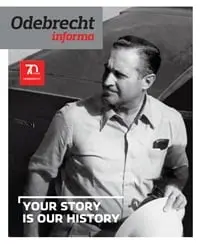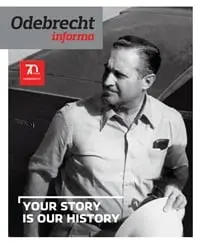Written by Livia Montenegro
Photo by Almir Bindilatti

The things Francisca Antônia de Araújo, 48, likes best about the countryside are the smell of wet earth and the sound of birdsongs. A resident of the Juliana community in Piraí do Norte, Bahia, one of five districts located within the boundaries of the Pratigi Environmental Protection Area (APA), she is an impassioned conservationist. “We need to care for and preserve the environment. That’s the only way we can change the future of our region,” she says.
Francisca has the support of the Land Conservation Organization (OCT), an NGO that operates within the Pratigi APA and encourages three initiatives: environmental conservation, reforestation and productive conservation. “Our goal is to develop a practical method for proper treatment of the elements of nature, the flows of life. That means establishing safe means of promoting sustainability,” observes Joaquim Cardoso, Chairman of the Board of OCT. That institution is part of the Development and Integrated Growth Program with Sustainability for the Southern Bahia Lowlands Environmental Protection Areas Mosaic (PDCIS), which the Odebrecht Foundation and partners are deploying in that region.
érico Araújo, 23, is an OCT technician. He led Francisca’s orientation. A graduate of Presidente Tancredo Neves Rural Family House (CFR-PTN), a teaching unit connected to the PDCIS, he is clearly pleased to be contributing to local development. “I feel fulfilled, because my goal has always been to transfer knowledge to people who don’t have access to an education focused on the countryside,” he emphasizes.
Francisca believes that this support is crucial and has helped change her thinking and behavior. “I used to chop down the forest, but now I have everything I need here on my small farm. I’m proud that everything has been done with my own hands,” she says.
She has planted eucalyptus trees on her property as a strategy to reduce the pressure on logging and prevent deforestation. She has also learned to make eco-organic fertilizer and planted different crops on a one-hectare parcel of land, such as rubber, cocoa, banana and soursop trees using the method known as the Agroforestry System (SAF).
“The SAF was introduced here free of charge to guarantee an income for farmers who set aside part of their land for conservation,” says Volney Fernandes, Executive Director of OCT. Francisca adds, “Before, I had to pay for assistance and used chemicals. Now I make the fertilizer myself. That has changed the quality of my crops, besides saving money and inputs,” she says.
The farmer wants to go even further and dreams of establishing a Private Natural Heritage Reserve (RPPN). “RPPNs are set up voluntarily in private areas by the owners and help preserve biological diversity,” explains Fernandes. Francisca just needs to complete the paperwork on her property to get started. “All I want to do is grow and develop myself more and more, with a commitment to respecting nature,” she points out, clearly in a mood to celebrate.

Synergistic programs
Jairo de Sousa, 36, lives about 20 km from Francisca’s property. A resident of the Vale do Riachão community in Igrapiúna, Bahia, he believes in achieving sustainability through access to knowledge. “Learning creates change, and now I know the right and harmonious way to work,” he observes.
Jairo is taking part in the Payment for Environmental Services Program (PSA), an OCT initiative through which he is helping preserve the environment. “I’ve reforested the area around a spring on my property, and I’ve learned the importance of living in harmony with nature. Also, I have an SAF that bolsters my monthly income,” he adds.
Jairo’s property has received social/environmental certification from the OCT. He also plants peach palms on his land and is a member of the Hearts of Palm Producers’ Cooperative of the Southern Bahia Lowlands (Coopalm).
“We have everything we need to develop in the countryside,” he says. His wife, Genilda Souza, 30, helps him with the day-to-day work on the farm. She is a graduate of the Youth House High School, which, like Coopalm, is also a PDCIS institution. “I shared everything I learned with my husband. We are working together for a better future,” says Genilda.
Partnerships for sustainable growth
Odebrecht Group companies are also doing their bit by implementing environmental protection programs in the Southern Bahia Lowlands. They include Odebrecht Oil & Gas, which has offset 630 metric tons of carbon dioxide (CO2) emissions from its offices in Macaé, Rio de Janeiro, and Itajaí, Santa Catarina. To do so, more than three thousand saplings will be planted on the farmers’ properties and three springs will be restored through the Pratigi Carbon Offsetting Program, another initiative run by the OCT.
“We’ve created an opportunity on the basis of an environmental project, so everyone feels they have a responsibility to make a contribution,” says Renan Kamimura, OCT’s Environmental Conservation Leader.
More than 570 saplings have also been planted to offset the CO2 emitted during the award ceremonies for the Odebrecht Sustainable Development Prize held in 2011 and 2012. Emissions are calculated on the basis of factors such as electricity, transport used by guests, and water consumption. The restoration of over 155 hectares with native Atlantic Forest plants and the recovery of 60 springs have made it possible to offset more than 32,000 metric tons of CO2 in the Pratigi APA.


